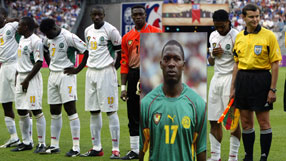FIFA to honour Foe at Confed Cup final
JOHANNESBURG - FIFA will commemorate the death of Cameroon midfielder Marc-Vivien Foe with a special event before the Confederations Cup final at Ellis Park on Sunday.

Foe collapsed on the field and lost consciousness during a Confederations Cup semi-final against Colombia at the Stade de Gerland in Lyon, France on June 26, 2003.
After attempts to resuscitate him on the pitch, medics spent 45 minutes at the stadium's medical centre trying to restart his heart, and although he was still alive when he arrived there, he died shortly afterwards.
He was later found to have suffered from hypertrophic cardiomyopathy, a heart-related disease. He was 26.
"Just before the kickoff when the teams are assembled in the middle of the field, we will have a message to the world about what happened," FIFA president Sepp Blatter told a news briefing on Monday.
"It was a very sad and tragic event, but what has come out of it is that football learnt about cardiological diseases.
"In the meantime we have addressed the problem and although it is impossible to control the millions and millions of football players in the world, at least in FIFA competitions not only at the highest level, but also lower down, we are trying to prevent similar tragedies."
He said tests carried out on teenaged players from eight African countries at a preliminary round competition for this year's Under-17 World Cup showed that one player had a heart disease which would otherwise have gone undetected. The player was now receiving treatment, Blatter said.
Get FourFourTwo Newsletter
The best features, fun and footballing quizzes, straight to your inbox every week.
"But we also found that 60 per cent of the players had never seen a doctor in their lives and had never had any access to any medical care at any time," Blatter added.
"One of the legacies of Marc-Vivien Foe's unfortunate death and having the World Cup in Africa is that FIFA is providing medical care and aid where we possibly can."
Foe died when he was making his 64th international appearance.
He played at club level for Manchester City and Racing Lens, among other sides. City retired the number 23 shirt he wore, while at their new Eastlands stadium there is a small memorial garden for him. Racing Lens renamed an avenue near their Felix Bollaert Stadium after him and he was given a state funeral in Cameroon.
